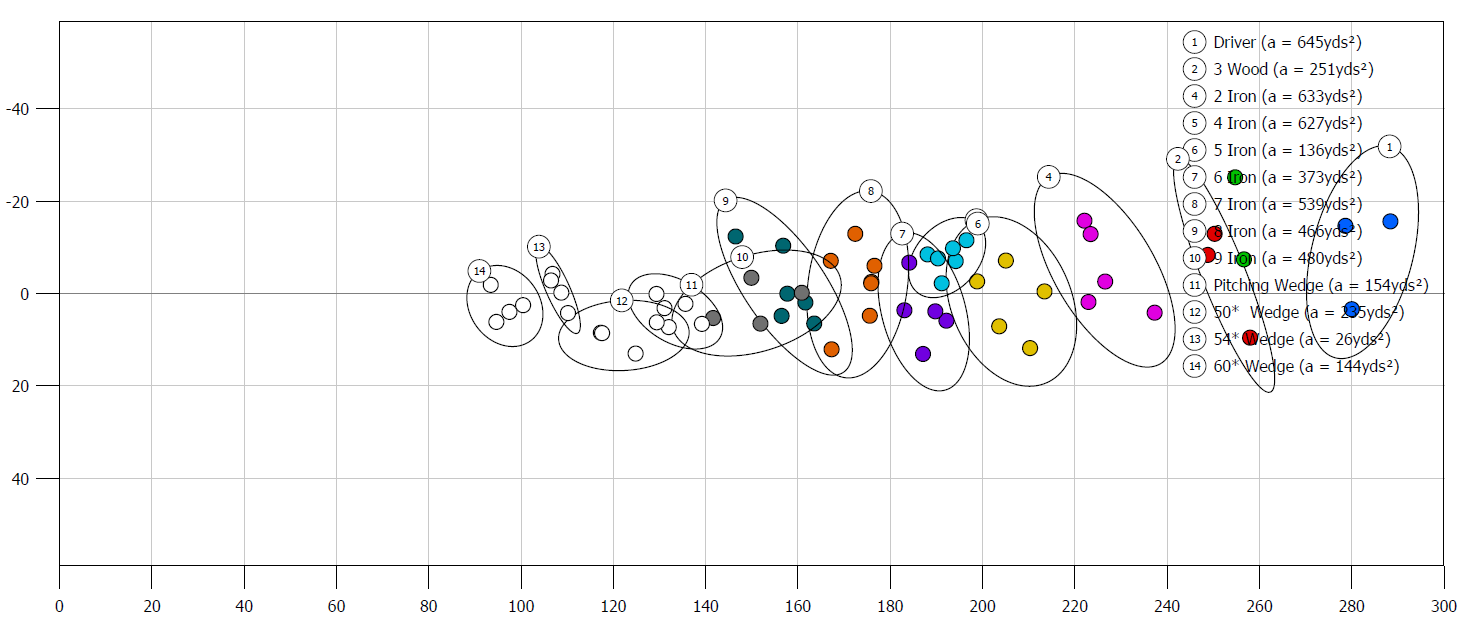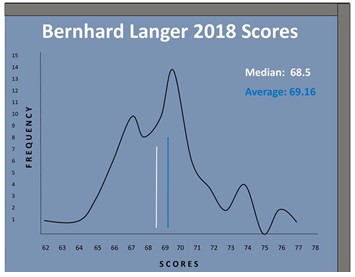Mindset
To get moving into the correct mindset about improvement I want you to group yourself into one of two categories below. Understanding what is possible and what may not be is paramount to setting achievable goals.
A) I define consistency as hitting the ball relatively the same every time I play or practice golf. Scoring within a range of a few stokes, just like TOUR Players do
B) I will seek to better myself daily, understanding that there will be setbacks physically, mentally, and psychologically. I am understanding of my score being as many as 15 stokes different daily, depending upon conditions, and physical and mental preparedness.
Most of us and many of the players that come to a lesson tee looking for guidance are smack dab in the middle of Group A. The truth is that all of us have a little of Group A in us. But really good players generally reside in Group B. Changing your mindset to a Group B player will take time, understanding and most likely some convincing. To that end, there will be a lot of TOUR player talk in following paragraphs. In full transparency there is just more data, so it is hard not to. Plus, most of us can relate to them on some level, because we watch it so often on television or visit the events in person.
On the other side, arguably, we should not compare ourselves to TOUR players. They have more time to practice, play, generally more funds to pursue coaching and training. They also potentially possess physical gifts and talents which we quite frankly do not. Which means it may not be wise to compare. On the other hand, they are just humans playing a game. Key concept/ term being Human. Golf is a Human game, which means by default it will be inconsistent by nature because there are human variables. This is an important thing to be able to accept mentally.
Expectations
Everybody wants to be consistent with their golf games. Defining that is sometimes hard and often unattainable in golfs current form. Most amateurs’ expectations of consistency mirror what they perceive of TOUR players. Players so good that they can, on command hit any target desired at any distance. This perception can be due to any number of factors, glorification of certain players over the years, TV Commentators, only the best players of any given week being televised, lack of physical exposure to good players, or just normalcy bias. All of this can paint a picture that the best in the world have a rifle and can simply point, shoot, and fire… ala consistency.
However, learning that the best on the planet still experience troubles is the first step toward facing the reality of the game we play. The average round on tour consist of 12 greens in regulation, ( reaching the green in three shots on a par five, two on a par four and one on a par three) and in fact for any given year on the TOUR there are only about five to six rounds that actually accomplish 18 greens in regulation. That is not five to six rounds per player, that is for the entire TOUR for any given season. The reality with full swing is that they have a shotgun, not a rifle, and that shotgun blast has a different radius pattern (see picture below) with every respective club.

Then we can move to score, TOUR Players are consistent when it comes to score. Right? Ultimately it depends on how we define consistent. If we use the example of a TOUR Player over the period of a 72-hole tournament scoring could seem relatively consistent or the same. How about over the season? I choose someone I perceived to be very successful, the winning est player in Champions TOUR history, Bernard Langer. His score range over the 2018 season is listed below.

Low Score of 62, High Score of 77. Really good playing and amazing to have a scoring average that is sub-70. However, is it consistent by the average golfer’s definition? From my conversations with the average golfer I would say that a 15-stroke span would be considered inconsistent relative to their own scores.
Actual quotes from my lesson tee, from an average golfer:
“I shot an 85 the other day and played pretty well. Then the very next week I went out and ballooned all the way up to 93. I just need to be more consistent.”
“My last six rounds have been: 87, 85, 89, 81, 85, and 90. I just can’t achieve the level of consistency that I want to.”
Back to TOUR players for a second, I’ll do another graph. Justin Thomas had an incredible year in 2017 winning five times, including his first Major, and amassed over $9 Million in winnings. The most impressive feat is that he won five times over the period of 11 months, and certainly could fit the narrative that he was consistent over the entire year.

However, he also missed five cuts, including three in a row. He missed three cuts and had a T47 Finish right before winning the PGA Championship in August. His season high score was an 80 (Open Championship) and season low score was a 59 (Sony Open) coming in at a whopping 21 stroke difference. Again, quality scoring average, quality results, amazing play, and totally world class, but is it consistent as compared to expectation of the average golfer?
On average TOUR players perform within a 15-stroke difference during a competitive season. We are dealing with the best in the world with that stat, but I think it is highly relevant to the average golfer. Golf is played over an ever-changing environment, and our bodies change daily based on amounts of preparation, activity, diet etc. We will experience different scores and we will shoot the same score in different ways, that is the nature of golf. A neutral and relevant goal should be to be able to accept a scoring range as noted above. If you are unhappy with the low score in your range, then you must work very hard to drive the low score down. If you are unhappy with the high score in your range, you must also work to lower your low score, but also be accepting of the fact that there is a high score in that range still possible.
Goal Setting
Consistency in golf is adjusting to what is happening in an ever-changing environment over a period time. That might seem generic, but it encapsulates what golf is. The other truth that I have discovered after spending the last 15 years with the average golfer, is that not all goals are score goals. Some just want to hit the ball a little better to enjoy the game more, or to simply impress their father in-law. The keys to goal setting:
- Define what you want to be consistent at, and don’t just say golf. Dig down to the roots and figure out what you really want. To shoot lower scores. To hit the ball better. Wait aren’t those the same thing? No, because there are multiple pieces of the game all taking different skills and if you hit 15 greens in regulation and three-putt five of them, while making double on the other three because you bladed the wedge shots over the green…you will still not shoot lower scores.
- Inform yourself what is possible. As stated above, there are (on average) 5 rounds of golf a year that include 18 consecutive greens in regulation (GIR) on the PGA Tour. Not per player, but per the whole Tour Annually. Let that sink in. GIR average on Tour is 10-12 greens. That is the reality, and the other reality is that the average amateur hits four – five greens in regulation a round. If they can move that number to six, their score will go down. Inform not to overwhelm, but to enlighten as to what humans are truly accomplishing while playing this game.
- Practice different, way different, like in ways you wouldn’t begin to think of… different. The bashing of 7 irons for 40 minutes every two weeks is not doing anything for you and in fact it is probably making on-course performance worse. Read the practice section, and just consider it to be the “How Do I Achieve Consistency,” section.
What Should I Expect to be “Consistent” at?
- Score…as long as you have a range, Tour players generally subscribe to the magic number of 15. Sometimes not though, remember Justin Thomas’ 2017 where he was the PGA Tour Player of the year and won the PGA Championship? 21 stroke difference between lowest/highest score. So, give yourself a range, let’s call it 15- 20 stokes and be comfortable in that range. If you spend the night before in a different sleep pattern, consuming to many beveratos, miss the warmup time, and have never played the course before, expect to be at the high end of the mark. If you prepare to the fullest, warmup, practice well for weeks beforehand, mediate, and stretch, you may still hit the high end of your range, welcome to golf.
- Skill Development…this should be what you strive to be consistent at. Developing skills to overcome different situations. What is a skill? Speed control in putting, trajectory control in wedge play, low point control, reading lies, understanding descent angle etc. These are all things that give you the ability to manage your human self over the long haul.
- Initial Starting Direction…where the ball is starting in relation to the target in full swing, or if the ball is starting on the line you intend it to in putting. This can be relatively controlled throughout a season. There will always be high points and low points, but it should be referenced and attempted.
- Body Preparation…yes that body. It is what the club is moving around, or what moves the club depending on your philosophy. Keep your body moving and functioning consistently is key to playing consistently. If you wake up one morning and your shoulder hurts and there is a crick in your neck, do not expect your golf swing to function as it normally does
- Positive Mental Outlook…it’s important never undersell it.
- Consistency…I had to laugh writing that one. Those who consistently schedule practice and instruction improve the most over time. Just so this does not sound like a plug to sell instruction focus on the practice part. Don’t get lost in how much time (all of us need more) get lost in skill development and in regularity of practice.

